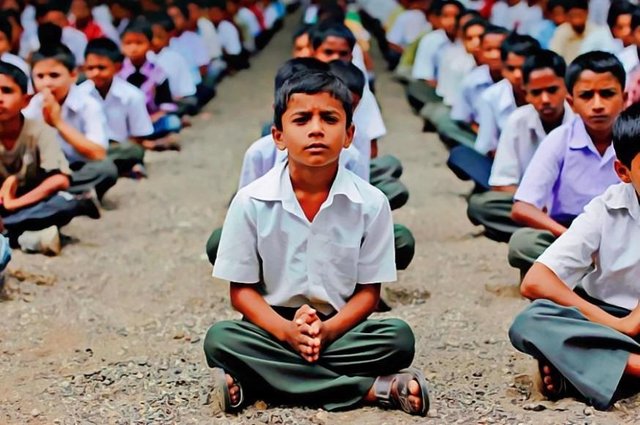India’s Schools Need the Light of Inner Discipline, Not the Militarisation of Consciousness

Recent reports of the Prime Minister’s Office advising the human resource development ministry to introduce elements of military school training and ‘patriotic’ sentiments in regular schools has left me disturbed. As a teacher with sustained engagement with critical pedagogy and life-affirming education, I feel that this is yet another effort at militarisation of consciousness and equating discipline with non-reflexive obedience. A debate on the merits of such a decision should not be limited to the government or its ideology; instead, it should be about the socio-philosophical and pedagogic enquiry into the dynamics of discipline, freedom, creativity and education.
Militarisation and the armor of outer discipline
“8.45 entrance of the monitor, 8.52 the monitor’s summons, 8.56 entrance of the children and prayer, 9.00 the children go to their benches, 9.04 first slate, 9.08 end of dictation, 9.12 second slate, etc.”
– Michel Foucault, Discipline and Punish: The Birth of the Prison
We know that the culture of schooling – with its ritualisation of uniform and assembly, architecture and spatial location of the pupils, and classroom transactions and curricular practices – is inseparable from the practice of discipline. In modern times, with the rise of state-centric societies, formal schools (rather than informal family-kinship ties) have become important and legitimate sites of socialisation. It is believed that schools train/discipline the child, and help them overcome the barriers of ‘particularistic’ ties and embrace ‘universal’ values of citizenship – how to relate to others, adhere to constitutional and legal principles, restrain purely egotistic drives and impulses, and merge with collective symbols and nationalist aspirations. In a way, as Emile Durkheim, a leading proponent of ‘moral education’ in a highly differentiated/complex society, argued, school education ought to build the bridge between the individual and the collective, specific aptitude and shared societal conscience, and restore ‘organic solidarity’; For this, as the master sociologist further added, discipline should play an important role. It is through discipline and the teacher as a moral guardian that the child learns a set of fundamental principles like regularity, control of body, adherence to the spirit of work and respect for collective norms.
Yes, this sort of discipline has its moral appeal; and many parents with some sort of civic religiosity want their children to be ‘disciplined’ in this way – ‘polite’, ‘socially conscious’ and partly ‘altruistic’. Good schools discipline the child – this is the general belief. However, there are two points of caution. First, discipline should not mean non-reflexive obedience, nor should it mean non-critical acceptance of everything that is projected as ‘national’ or ‘collective’, or even ‘sacred’.
Not surprisingly, critical pedagogues like Paulo Freire have repeatedly reminded us of this danger. If education becomes non-dialogic, if it means just a set of commandments from the all-powerful teacher; if it implies passive acceptance of all that is projected as ‘truth’, it destroys the learner’s creativity, understanding and self-confidence; it conditions the mind, reproduces the ‘culture of silence’ and becomes incapable of challenging the principle of domination.
Military training – with its mindless drilling, strict commandments, reckless hierarchy and elaborated techniques of punishment – often causes this intellectual numbness and dullness. Qualities like rising early in the morning, physical fitness and cleanliness of the body are not bad. But, if discipline comes out of fear, passivity and systematic destruction of all the faculties of imagination, it does not truly alter the inner world of the person. History has shown how otherwise ‘disciplined’ forces have behaved immorally in diverse situations. Just look at the narratives of war victims and ‘suspected’ citizens of ‘disturbed’ territories. Or noticed the body language of the children of ‘disciplined’ schools when they come out of school premises? All armors collapse and you see bullying, aggression, ugly jokes and vulgar comments.
As the likes of Michel Foucault wanted us to remember, this sort of discipline is an integral component of a society based on surveillance. With hierarchical observation, normalising judgement, time tables and examinations, discipline, Foucault said, establishes constant visibility over us, works on the depths of mind and consciousness, and produces docile (yet ‘productive’) bodies that receive commands almost instinctively. Yes, from Jeremy Bentham’s ‘panopticon’ to the latest CCTV camera, the technologies of discipline are everywhere – from military barracks to schools. It is not that this power discourse is necessarily bad. After all, power produces knowledge; and each regime of truth has its own discourse of power. Yet, through Foucaultdian eyes we can see the other side of discipline – the ‘military dream of society’.
The light of inner discipline
“Education is not just to pass examinations, take a degree and a job, get married and settle down, but also to be able to listen to the birds, to see the sky, to see the extraordinary beauty of a tree, and the shape of the hills, and to feel with them, to be really, directly in touch with them.”
– Jidu Krishnamurti
This critique of outer discipline – or its degeneration into the intellectual dumbness of militarisation – does not mean that I am pleading for nihilistic anarchy. As a teacher inspired by Rabindranath Tagore and Jidu Krishnamurti, I have always dreamed of the art of possibility – nurturing a generation of learners gifted with the spirit of inner discipline, creative freedom and intellectual clarity. Discipline in its true spirit, I believe, is not a child of fear; it emanates from light and love, clarity and awakening. And this is what differentiates true education from militaristic training.
 @exponentials
@exponentials